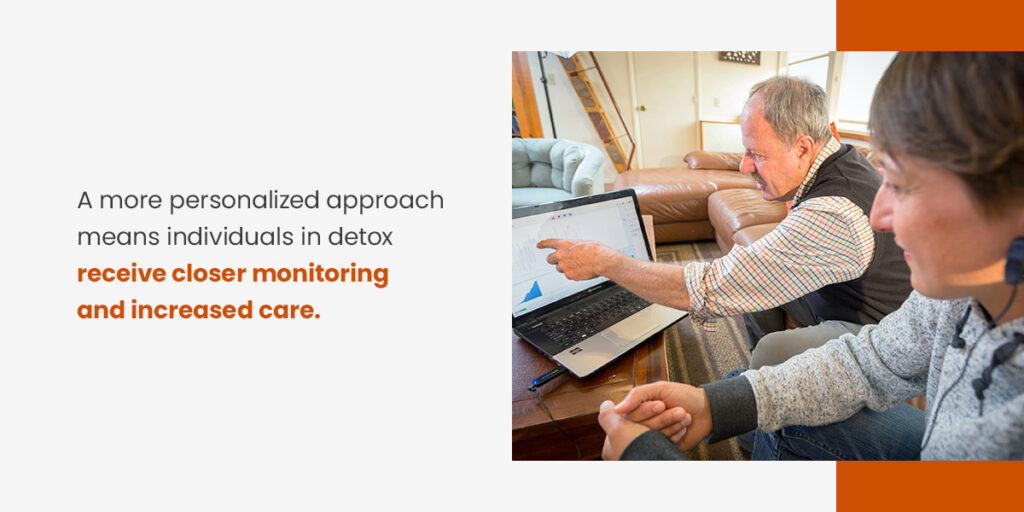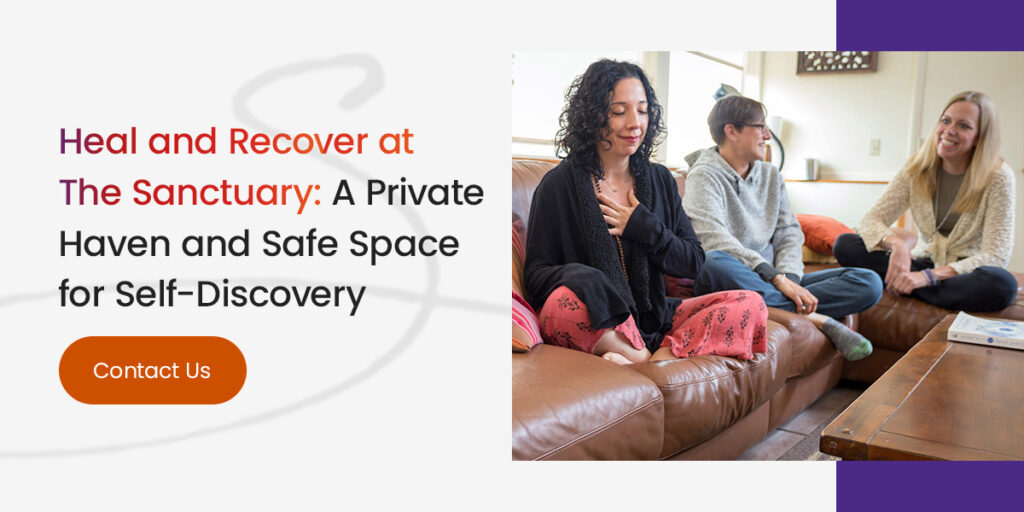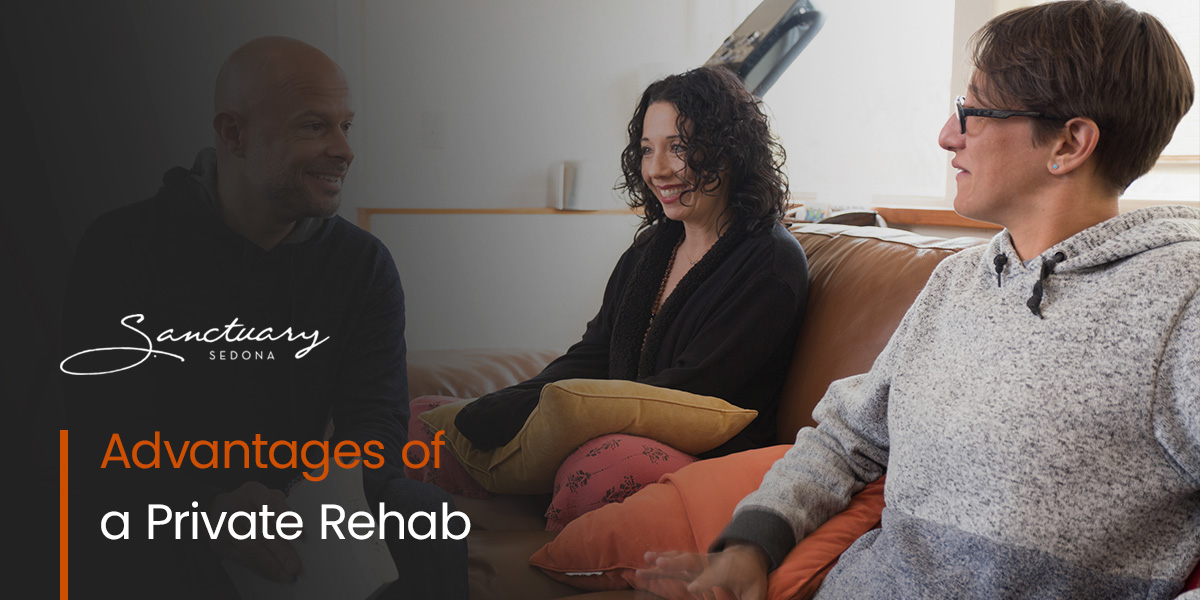Private rehab offers holistic care, enhanced privacy, individualized treatment and increased comfort that state facilities cannot provide. Receiving care and support in a private rehab center lets you recover in a healing environment with specialized, holistic treatment tailored to your unique needs.
What Is a Private Rehab?
A private rehab center offers more treatment methods, amenities, privacy and comfort than traditional rehab facilities. State-run rehab facilities provide treatment to those who otherwise couldn’t access it. However, many public facilities operate on severely limited resources. A lack of resources prevents state facilities from offering complete, holistic treatment experiences in the way private rehabs can.
A facility’s resources and treatments impact enrollees’ chances of success. Many state rehab facilities can only offer shared accommodations and group counseling sessions, resulting in discomfort and a lack of personal attention that can discourage individuals from completing their program.
Private rehabs can design their programs as they wish, allowing them to offer holistic and alternative treatments. These alternative treatments enhance conventional methods’ effectiveness and help clients enjoy their treatment experience more. Private rehabilitation providers typically position and design facilities with recovery in mind. Specialized staff and private, comfortable accommodations are common in private rehabs.
Benefits of Private Rehab
Receiving care in a private setting can significantly enhance healing and recovery. Consider the following advantages of a private rehab to learn how it can help you recover:
A Healing Environment
Private rehabs can offer more peaceful, healing environments than state rehabs can. The Sanctuary is located on a peaceful, 22-acre campus, framed by Sedona’s vibrant red rocks and desert evergreen forests and charged with the powerful vibrations of its nearby energy vortexes. It’s home to facilities you won’t find at a standard rehab. For example, our healing room with a deep soaking tub for cleansing salt and herbal baths gently encourages your body to release toxins, and we designed our nine-circuit sacred labyrinth to encourage contemplation and self-reflection.
A More Intimate, Personal Setting With Smaller Program Sizes
Private addiction treatment centers typically host far fewer clients at a time. Hosting fewer individuals decreases group sizes and helps clients gain trust and build relationships with each other easily. This connection-conducive setting significantly progresses the healing process because recovery’s social aspect is crucial. Relating to others’ shared experiences, receiving peer support and forging sober friendships is essential for lasting recovery.
Smaller program sizes also let private rehab centers provide individualized treatment with close medical supervision. The Sanctuary at Sedona tailors treatment plans to meet each person’s needs, providing the care and support that benefits them the most.
Fully Customizable Addiction Treatment

Rather than taking a one-size-fits-all approach, private rehabs can provide extensive individualization and personal attention. A more personalized approach means individuals in detox receive closer monitoring and increased care. It also means individuals in treatment receive plenty of one-on-one counseling laser-focused on their experiences and concerns.
A private treatment center can create personalized treatment plans based on a thorough assessment of your background, circumstances and needs. It partners you with a team of practitioners who work together towards the common goal of your wellness. This level of care assures you’re nurtured and well-looked-after throughout your treatment stay, which provides an important level of reassurance, encouraging you to see it through.
Extra Privacy and Confidentiality
Exclusive rehabs provide an extra layer of privacy. They’re often set in secluded locations and take their clients’ privacy seriously. Rehab should be a place where you can leave your outside worries at the door and relax into a space that makes you feel comfortable focusing on yourself. Private rehabs can allow you to do just that.
Transitional Planning and Aftercare Support
Private rehabs offer excellent transitional planning and aftercare support. They help individuals return to their home lives with the necessary continuing care and coping skills to prevent relapse. Completing a private rehab program helps people transition back into their homes, jobs and family life smoothly to continue their lives with hope and optimism.
The Sanctuary helps individuals sustain health and wellness with a supportive aftercare strategy. This ongoing support extends our holistic approach, helping each person continue recovery and create a life that aligns with their core values and authentic self. Individuals can receive weekly support calls, attend alumni retreats throughout the year or participate in The Sanctuary’s 30-day Bridge Program for continued healing.
Amenities
Private rehabs typically feature more amenities than state-run facilities, providing individuals with more recovery resources. The Sanctuary supports people with the following amenities:
- Private, upscale accommodations
- Fitness facilities
- Gourmet meals
- Recreational activities
- Fitness and nutrition counseling
- Spa treatments such as massages and sweat lodging
- Holistic, evidence-based treatments such as music and art therapies and adventure therapy
Is a Private Rehab Center Right For You?
A private rehab is right for you if you seek support beyond traditional recovery methods. It also offers enhanced privacy, making it an excellent option if you prioritize confidentiality.
Heal and Recover at The Sanctuary: A Private Haven and Safe Space for Self-Discovery
Rehab with private rooms, excellent amenities, a healing environment and holistic treatment methods significantly enhances healing and recovery. If you are seeking a private rehab in Sedona, The Sanctuary can provide you with effective, holistic treatment in a highly spiritual and healing location. The Sanctuary’s integrative addiction recovery program entails a thoughtfully designed treatment plan that’s fully customized to treat your unique set of preferences and needs.
We incorporate a wide range of modalities to comprehensively treat your whole self and give you the tools you need to build a better future. All of our program graduates say they use the knowledge they learned during their stay with us to better their lives – 70 percent of them on a daily basis. Contact us to request a call and learn more about our program offerings.


He is the Founder, Administrator, Counselor at the Sanctuary at Sedona.
He has a BA in Political Science and is currently Senior teaching staff at Four Winds Society, an international school of energy medicine. His credentials also include being an Ordained Minister; a Certified Shamanic Breathwork® Facilitator; a Founding Member Society for Shamanic Practitioners; a Member of Association for Comprehensive Energy Psychology; a Member of the National Institute for Holistic Addiction Studies. [email protected]

